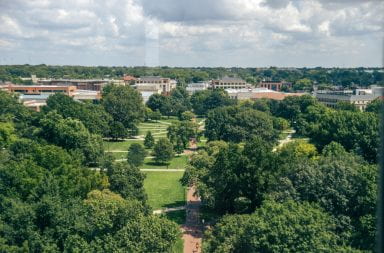The Ohio State University Medical Center is doing its share in cancer research, and some big help is coming in March.
The Medical Center established a neurological surgery department in December. Dr. E. Antonio Chiocca, an associate professor of neurosurgery at Massachusetts General Hospital and Harvard Medical School, will chair the new division. The university Board of Trustees approved both decisions on Dec. 5. The new branch is expected to complement neuroscience, neurology and cancer research at the medical center.
“I am looking forward to working with and contributing to the outstanding scientific and clinical environments that exist at the Ohio State Medical Center, the James Cancer Hospital and Solove Research Institute, and The Ohio State University. I have met some incredible individuals with excellent scientific and clinical credentials and I hope to be able to collaboratively interact with them,” Chiocca said.
The James Cancer Hospital and Richard J. Solove Research Institute is one of only 39 National Cancer Institutes designated as a comprehensive cancer center, according to the hospital Web site.
Neurology deals with the central nervous system and the disorders affecting it.
“The Department of Neurological Surgery will provide outstanding clinical care in all facets of neurosurgical disease to the community, the region and, hopefully, the nation,” Chiocca said.
Chiocca has been a faculty member at Harvard and a practicing surgeon at Massachusetts General Hospital since 1995. He graduated from the University of Texas Medical School at Houston. He received his doctorate from the Graduate School of Biomedical Science at the University of Texas Health Science Center. Chiocca is involved in more than 12 research projects. He has authored or co-authored 100 articles or book chapters and holds three patents.
“The discipline (neurological surgery) encompasses surgical disorders of the brain, spinal cord and its surrounding structures, and of peripheral nerves. We plan to provide highly specialized care for diseases such as tumors, cerebral aneurysms and vascular malformations, epilepsy, traumatic injuries and Parkinsons’ disease,” Chiocca said.
The department will also provide excellent education in these diseases to medical students and postgraduate trainees. Members of the neurological surgery department will contribute to the search for scientific and clinical knowledge in order to improve diagnosis and treatment of these disorders, Chiocca said.
According to the American Cancer Society, an estimated 555,500 Americans are expected to die of cancer this year, more than 1,500 people per day. Cancer is the second leading cause of death in the United States behind heart disease. In 2002, there were 17,000 new cases of brain cancer, with 13,100 of those cases diagnosed as fatal.
Chiocca’s research focuses on brain tumors such as malignant glioma and their treatment with the use of gene therapy.
“We are trying to understand the molecular and cellular mechanisms that punctuate the progression of these tumors and to devise more efficient treatments to increase the life span of patients that are inflicted by this type of incurable cancer,” Chiocca said. “Tumors in the brain are very complex, we are collaborating with scientists in physics, radiology, and material sciences to try and determine if tumors in the brain follow a certain set of rules, which can be predicted and modeled.”
The financing to create the neurological surgery division comes largely from the Esther Dardinger Fund, a $14.1 million fund created by the Ohio Supreme Court to further cancer research. The Esther Dardinger Neuro-Oncology Center is dedicated to the research and treatment of cancer that affects the nervous system, said Emily Caldwell, a spokeswoman for the medical center.
The fund was created to enable the James Cancer Hospital to recruit additional researchers with an expertise in the area of neuro-oncology, according to a press release from the medical center. The money endowed the chair in oncological neurosurgery to be held by Chiocca, and the chair in neuro-oncology, held by Dr. Herbert Newton.
Neuro-oncology is the branch of medicine that deals with tumors, including the study of their development, diagnosis, treatment and prevention.
“We are looking to create new therapies for our patients. The addition of Dr. Chiocca translates into new studies, phase one trials and the hope of eventual testing. Our strengths in research complement each other. I am looking forward to combining our expertise to start something new,” Newton said.
“I hope that we can find ways for collaborating with disciplines that are traditionally outside a medical school. I currently have collaborations with a physicist, a material sciences engineer, a pharmacologist and a veterinarian,” Chiocca said. “Collaboration is important since it promotes our ability to look at problems in different ways in order to come up with the best solutions.” Chiocca said.


